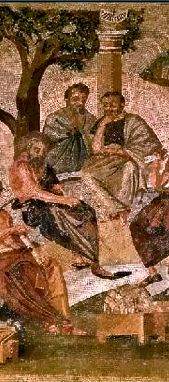Plato's Symposium
The Symposium is a philosophical dialogue written by Plato sometime after 385 BC. It is a discussion on the nature of love, taking the form of a series of speeches, both satirical and serious, given by a group of men at a symposion or drinking party at the house of the tragedian Agathon at Athens.
The Symposium was presumably composed around the same time as Plato's Republic and Phaedrus; with those two texts, it is often considered one of Plato's literary high points. Plato takes great care to make the setting realistic and the historical context credible. Although this may be far from its original purpose, the dialogue has been used as a source by historians exploring Athenian social history (particularly the symposium as an institution) and sexual behaviour.
The seven participants are:
- Phaedrus (speech begins 178a):[1] also familiar from Phaedrus and other dialogues, his approach here is literary
- Pausanias (speech begins 180c): the legal expert
- Eryximachus (speech begins 186a): a stereotyped physician
- Aristophanes (speech begins 189c): the famous comic poet seems at first to be "played for laughs", but his origin myth for the three genders (homosexual, lesbian, and heterosexual) is both fantastic and serious
- Agathon (speech begins 195a): a self-consciously poetic approach, which is gently mocked[2] by --
- Socrates (speech begins 201d): familiar to us as Plato's teacher, in this dialogue he retells religious teachings which he attributes to the priestess Diotima
- Alcibiades (speech begins 214e): reminiscences of his own encounters, amorous or not, with Socrates
The Symposium is a relatively short work, highly readable, witty, and also morally and philosophically profound.[1]
